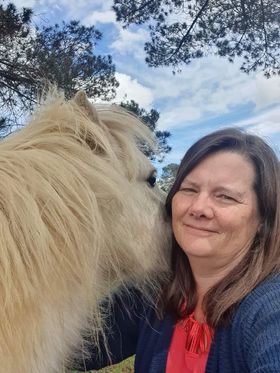How did you start volunteering with ARF?
I was introduced to ARF by my sister Raelene Stewart around 18 years ago. Goodness where have those years gone. She had started rescuing through the group and I thought we could also help to make a difference for the dogs. We had rescued the odd dog here and there ourselves in the years prior to joining ARF so it was already something I was passionate about.
What was your role as a foster carer like?
Being a foster carer can be both challenging and extremely rewarding. Some dogs need a lot of rehabilitation while others were complete angels and you wonder how they found themselves in the pound. The rewards definitely outweigh the challenges. It is through your greatest challenges you learn. That is what being a foster carer does. It teaches you so much. If something happens or there’s an issue you need to work on, there are people to help guide you. You learn about dog behaviour, dog health, dog training, human behaviour and dealing with difficult clients. It honestly has taught me so much. There is nothing more rewarding than to take a dog from the pound, rehabilitate it and see it into its new forever home which is filled with happiness. These days we get a lot of messages saying that their dog has passed on. While this is sad, it shows how much its family loved it. To go from a waif in the pound, on the wrong side of the road so to speak, and to live a long happy and loving life is beyond rewarding.
What has been the most difficult/most surprising moment of being a foster carer for you?
Perhaps the most surprising and difficult moment was when we had a bitch come into care 10 days before she had pups. Gypsy was just a small/medium girl but had 10 pups. She developed very serious mastitis and a mammary abscess when the pups were 2 weeks old. We had to remove the pups from her and bottle feed them. It took 1.5 hours every 3-4 hours to feed all 10 pups. Fortunately, we only had to bottle feed them for another week and a half until they were able to start lapping themselves. I can also say that 10 pups make A LOT of mess to clean up 🙂 but we still enjoyed every moment of doing this.
What makes a good foster carer?
A good foster carer is someone who loves animals. It is important to be logical and know what you are and are not able to do. It is important to have knowledge of how to care for the dogs and also to train them. Being able to provide consistency and boundaries is very important for foster dogs. You also have to be prepared for a level of destruction in your home. They will chew or mess in your house and are likely to damage your garden.
What drives you to continue to support ARF?
The animals need us and ARF is a very professional organisation with great ethics. They care for both the animals and the carers. ARF has an excellent reputation in rescue and they have worked very hard to do that. I will always endeavour to support ARF to do the amazing work that they do.
What else can you say about your time in ARF?
My time with ARF has been very rewarding. I have been able to make a difference for animals and people, two of my greatest loves. I have learned a lot and I have made life-long friends. I have also learned extensive amounts about everything dog and also about the running of organisations. Thank you ARF for supporting me.

